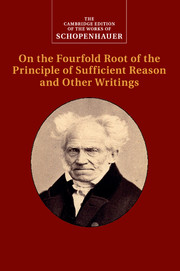Book contents
- Frontmatter
- Contents
- General Editor’s Preface
- Editorial Notes and References
- Introduction
- Notes on Text and Translation
- Chronology
- Bibliography
- Collation of the Two Editions of On the Fourfold Root
- 1 On the Fourfold Root of the Principle of Sufficient Reason
- 2 On Vision and Colours
- 3 On Will in Nature
- Glossary of Names
- Index
Sinology
Published online by Cambridge University Press: 30 June 2022
- Frontmatter
- Contents
- General Editor’s Preface
- Editorial Notes and References
- Introduction
- Notes on Text and Translation
- Chronology
- Bibliography
- Collation of the Two Editions of On the Fourfold Root
- 1 On the Fourfold Root of the Principle of Sufficient Reason
- 2 On Vision and Colours
- 3 On Will in Nature
- Glossary of Names
- Index
Summary
Nothing speaks so directly for the high standing of the civilization of China than the almost unbelievable size of its population, which, according to G¨uzlaff's statement, is now estimated at 367 million inhabitants., For, if we wish to compare ages or countries, we will see that on the whole civilization keeps pace with population.
The obtrusive eagerness of the seventeenth- and eighteenth-century Jesuit missionaries to teach their own comparatively new religious doctrines to ancient peoples, along with their zealous striving to seek earlier traces of these doctrines in China, prevented them from becoming thoroughly informed about the religious doctrines prevailing there. Therefore Europe did not gain knowledge of the state of religion in China until our times. We know that there is first of all a national worship of nature, which is embraced by all and which stems from ancient times, allegedly even from times when fire had not yet been discovered and so animal sacrifices were offered up raw. To this worship belong the sacrifices that the emperor and great dignitaries publicly offered at set times or after great events. Above all, these sacrifices are devoted to the blue skies and the earth, the former at the winter solstice, the latter at the summer solstice, and after that to all possible natural powers, such as the sea, mountains, rivers, winds, thunder, rain, fire, etc. in each of which there presides a genius for whom there are numerous temples; these are also dedicated to the presiding genius of any province, city, town, street, even a family burial plot, indeed, sometimes a shop; these latter obviously receive only private worship. But besides, public worship is offered to the great, former emperors, the founders of dynasties, as well as heroes, i.e. all those who through teaching or deed had been benefactors of (Chinese) humanity. These too have temples; Confucius alone has 1650 of them. Thus there are many small temples all over China. This worship of heroes is connected to private worship, which every respectable family offers to its forebears at the grave site. – Besides this general nature and hero worship, and for more dogmatic purposes, there are three religious doctrines in China.
Information
- Type
- Chapter
- Information
- Schopenhauer: On the Fourfold Root of the Principle of Sufficient Reason and Other Writings , pp. 431 - 440Publisher: Cambridge University PressPrint publication year: 2012
